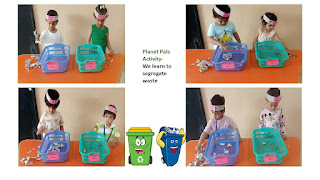Sensory Play: Exploring the World Through Touch, Taste, and Smell
As a parent of a preschooler, you're likely familiar with the concept of sensory play. It's a term that's often thrown around in parenting circles and early childhood education, but what exactly is it, and how does preschool school introduce these crucial concepts to your child?
Sensory play is a captivating and enriching way for individuals, especially children, to engage with their surroundings and foster a deeper connection with the world. Through tactile sensations, taste adventures, and aromatic exploration, sensory play encourages the development of essential cognitive and motor skills while stimulating creativity and curiosity. Sensory play is an integral component of the curriculum in every preschool in Gurgaon, underscoring its significance in early childhood education.
Here are some more insights!
The Benefits of Sensory Play
Cognitive Development: Sensory play stimulates brain activity by encouraging problem-solving, critical thinking, and creativity. When children explore different textures, tastes, and scents, their brains process this information, fostering cognitive growth.
Language Development: Engaging the senses helps children build a rich vocabulary. They learn to describe what they feel, taste, and smell, which enhances their ability to communicate effectively.
Fine and Gross Motor Skills: Activities like squeezing playdough, pouring water, or manipulating objects help improve both fine and gross motor skills, aiding in physical development.
Emotional Regulation: Sensory play provides a safe and enjoyable outlet for children to express their emotions, reducing anxiety and promoting emotional regulation.
Social Skills: Group sensory activities at preschool allow children to interact with their peers, fostering social skills such as sharing, cooperation, and empathy.
Preschool and Sensory Play
Preschool schools are well aware of the importance of sensory play in a child's development. They incorporate various activities and techniques to engage a child's senses, making learning both fun and educational. Here are some ways preschools introduce sensory play:
Sensory Stations: Many preschools set up sensory stations where children can explore different materials like sand, water, rice, or even natural elements like leaves and rocks. These stations offer a hands-on experience, allowing children to touch, manipulate, and investigate the materials.
Playdough and Clay: Playing with playdough and clay is a classic sensory activity. Preschools often provide these materials, encouraging children to shape, mold, and create with their hands. This not only engages their sense of touch but also promotes creativity.
Cooking and Baking: Preschoolers are introduced to basic cooking and baking activities that involve measuring, mixing, and tasting. These activities stimulate their sense of taste and smell while teaching valuable life skills.
Nature Walks: Taking children on nature walks allows them to explore the outdoors, touch different textures like tree bark or grass, and smell the fresh air. It also fosters an appreciation for the natural world.
Sensory Bins: Sensory bins are containers filled with various materials like rice, beans, or sensory beads. Preschoolers can scoop, pour, and sift through these bins, engaging their tactile senses and encouraging imaginative play.
Messy Play: Every Preschool in Gurgaon embraces the messiness of sensory play. Activities like finger painting, water play, and mud puddle jumping allow children to get their hands dirty while having a blast.
Scented Play: Incorporating scents into play is a delightful way to stimulate a child's sense of smell. Preschools may use scented playdough, scented oils, or even scented markers for art projects.
Music and Rhythm: Musical activities, like singing, dancing, and playing instruments, engage a child's sense of hearing and movement. Preschools often include music and rhythm in their daily routines.
Why Sensory Play Matters
Nurturing a Love for Learning: Sensory play makes learning enjoyable and memorable for young children. When they associate learning with fun experiences, they are more likely to develop a lifelong love for learning.
Building Confidence: As children explore and experiment with their senses, they gain a sense of accomplishment and self-confidence. They learn that their actions can lead to exciting discoveries.
Fostering Independence: Sensory play encourages independence as children can explore and engage with materials on their own terms. This independence is vital for their overall development.
Preparation for Future Learning: Sensory play lays a strong foundation for future academic success. It enhances a child's ability to focus, problem-solve, and think critically.
Supporting Special Needs: Sensory play is especially beneficial for children with sensory processing disorders or developmental delays. It can help them adapt to sensory stimuli and build essential skills.
Tips for Parents
While preschool schools play a significant role in introducing sensory play to your child, there are also many ways you can support this at home:
Create a Sensory-Friendly Environment: Offer a variety of sensory experiences at home, such as different textures to touch, art supplies, and safe materials for taste and smell exploration.
Join In: Engage with your child during sensory play. Participate in activities like baking, crafting, or playing in the sandbox together.
Be Patient: Messy play can be, well, messy! Be patient and encourage your child's exploration, even if it means a little cleanup afterward.
Safety First: Ensure that all sensory materials and activities are age-appropriate and safe for your child. Always supervise when necessary.
Conclusion
Sensory play is a fundamental aspect of early childhood development, and preschools in Gurgaon like The Shri Ram Early Years play a crucial role in introducing children to this enriching experience. As parents, you can support and enhance these experiences at home, creating an environment where your preschooler can thrive and truly enjoy the journey of learning through touch, taste, and smell. Embrace the mess, the laughter, and the wonder as your child steps his/her foot on this sensory adventure.



Comments
Post a Comment